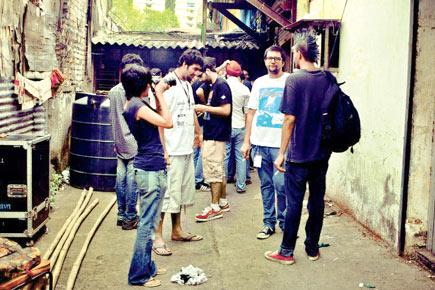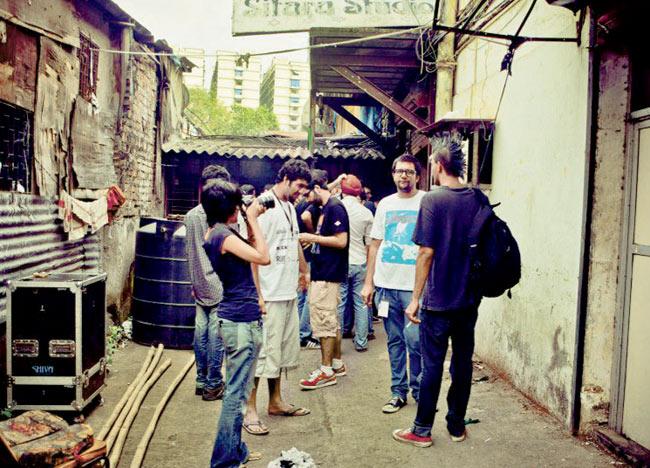Two events that happened last week are likely to impact Mumbai’s theatre scene in the months to come

Positive signs: The theatre community turned up in large numbers and the shows were packed for the staging of a play Hela at Sitara studio in Dadar
 Subodh Maskara launched Cineplay, with a filmed version of Dance Like A Man, to encouraging response. Unlike screenings of plays from London’s National Theatre, operas from the Met, or Ballet from the Bolshoi, Cineplay does not involve shooting a live performance, but filming a play in a studio, keeping the ‘theatre’ element of the work intact.
Subodh Maskara launched Cineplay, with a filmed version of Dance Like A Man, to encouraging response. Unlike screenings of plays from London’s National Theatre, operas from the Met, or Ballet from the Bolshoi, Cineplay does not involve shooting a live performance, but filming a play in a studio, keeping the ‘theatre’ element of the work intact.
Mahesh Dattani’s Dance Like A Man (directed by Lillete Dubey), for instance, has been turned into a feature film too (by Pamela Rooks), but watching it on screen in the Cineplay version is not the same as watching a movie, nor, obviously, is it meant to replace the experience of watching a play live.
ADVERTISEMENT

Positive signs: The theatre community turned up in large numbers and the shows were packed for the staging of a play Hela at Sitara studio in Dadar
But all versions of filmed theatre, whether NT Live, Cineplay, teleplays or DVDs of Marathi and Gujarati plays released after the production has completed its run, substitute the ephemeral nature of a live performance with a simple, direct communication of ideas that all great theatre is, our should be. Because theatre, unshackled from the constraints of recovering huge cinema budgets, can take up subjects that need to provoke and initiate thought.
Filming a stage play with finesse also means that the reach and the life of the play is extended, otherwise, once a production closes, it exists only on the page or in the memories of those who performed it or those who watched it, which means a few thousand people. But on screen, the work can be seen by millions. It is, admittedly, not as thrilling as watching a play on stage, but at least it preserves one performance forever. Now think of all the great plays theatre lovers missed, or never even heard of, because technology was not as advanced as it is today.
If NCPA’s audiences will see a Cineplay within its cultural context, Maskara’s collaboration with the Inox chain makes a Cineplay available to audiences every weekend. If the play appeals to them, maybe they will want to catch a live performance too. Maskara sees his Cineplay not as a competitor for theatre, but as companion. The filming of a play will also ensure that it is documented and preserved in some audio-visual form for future reference. Ordinarily, Indians are very lax about archiving and documenting; some years ago, a whole treasure of stills from plays was burnt, because the studio did not have the space to store, or inclination to preserve the negatives.
Recently, when London’s National Theatre celebrated its 50th anniversary, they had the recording of the first play staged there, and many others that came on subsequently. Sadly, except for one yellowing newspaper clipping, there is no record of the opening of Prithvi Theatre, which Mumbai considers a cultural landmark.
The other event was the staging of a play Hela, at Sitara Studio in Dadar — this under the endeavour of QTP and other groups to find alternative performing spaces, since Mumbai is in the happy (or unhappy, depending on where you stand) situation of having more plays produced than there are spaces to perform them in.
Getting to Sitara is quite an adventure — dug-up roads, a narrow dusty lane lined by chai stalls, surrounded by old mills and a new mall, and then a warehouse-like space that becomes a shooting floor, a venue for music gigs, exhibitions or pop up stores.
For those used to the comforts of a proper auditorium, Sitara isn’t fancy, doesn’t have a cafeteria (but the best vada-pao and tapri chai can be ordered), but the air-conditioning works and the loos are clean. The theatre community turned up in large numbers, along with true theatre lovers, and the shows were packed.
Must have reminded some seniors of the Chhabildas Movement days, when a hall in a school in Dadar became a hub for experimental theatre. If the art in theatre has to reclaimed, then more spaces have to be found where talented young people can perform.
The bureaucracy has to stop making it too tough or too expensive for unpretentious neighbourhood spaces to be converted into culture hubs. There is a lot of talent in this city, and despite the toll commuting can take on the mind and body, enough people who will promote offbeat events and many more who will go watch them even at out-of-the-way spots. If we don’t want the city’s people to hang out at malls for want of a better alternative, we have to push for more such spaces. And, as far as possible, keep the ticket prices affordable, but not offer cultural events free, for we have seen time and again, that anything that is free is not valued.
Deepa Gahlot is an award-winning film and theatre critic and an arts administrator
 Subscribe today by clicking the link and stay updated with the latest news!" Click here!
Subscribe today by clicking the link and stay updated with the latest news!" Click here!







